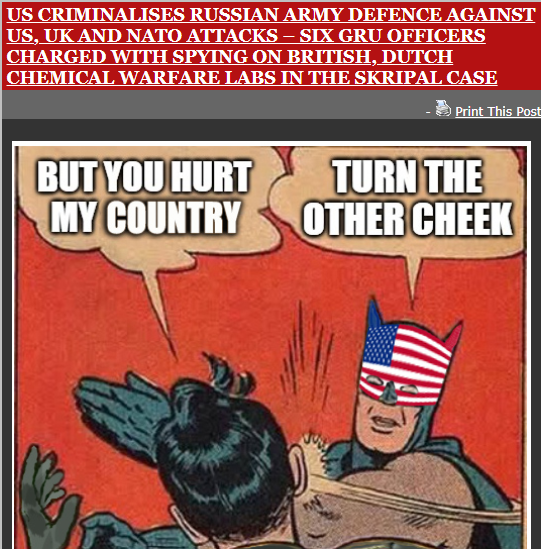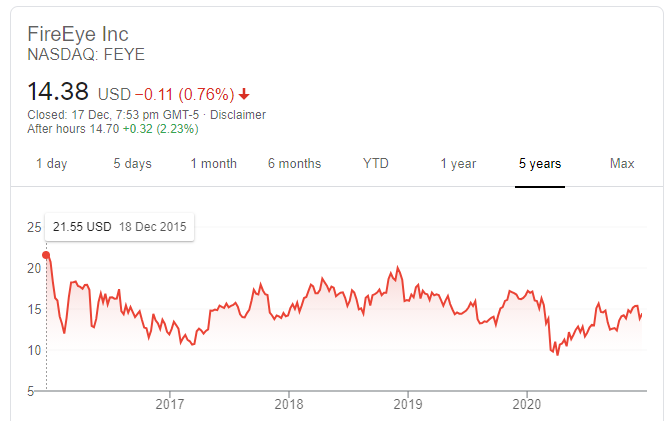

by John Helmer, Moscow
@bears_with
Since the Gulf of Tonkin incident of August 4, 1964, off the coast of Vietnam, the US Government has believed it has needed a lie, voted by a majority of the US Congress, to launch a war. Not since then has the Congress doubted, or the rest of us accepted, that a war-starting fabrication like that one will always succeed in Washington to start the war.
Nor has the truth of the incident — however delayed in discovery — brought the war to an end; nor inhibited the war party from starting the next one. Force deters or ends wars; truth does neither.
“This is virtually a declaration of war by Russia on the United States and we should take that seriously,” declared Richard Durbin, the chief whip of the Democratic Party in the US Senate on December 12, a month after he won election to a fifth term.
Durbin was referring to US government and media reports of the operation allegedly conducted by the Russian Foreign Intelligence Service (SVR) to penetrate the SolarWinds company software installations in US Government computers. What is unusual about this alleged attack is that there has been no confirmed damage, no casualty, no loss, reported Reuters “according to three of the people familiar with the matter”.
The New York Times claimed: “the broad Russian espionage attack on the U.S. government and private companies, underway since spring and detected only a few weeks ago, is among the greatest intelligence failures of modern times.” But the newspaper qualified this by adding it didn’t know this for sure. “The sweep of stolen data is still being assessed…Investigators were struggling to determine the extent to which the military, intelligence community and nuclear laboratories were affected by the highly sophisticated attack.” This followed months of investigation: “investigators spent Monday [December 14] trying to understand the extent of the damage.”
Durbin — born in 1944 to a Ukrainian mother and Irish father — was just out of short pants when the Gulf of Tonkin incident was staged by the Johnson Administration to commence its full-scale ground, air and naval war against North Vietnam and the Vietcong. There hasn’t been a war since then which Durbin didn’t vote for.
Except for a difference of wording to start the war against Iraq in October 2002. When the Senate considered the authorising resolution to launch that one and topple Saddam Hussein, Durbin proposed amending the authorisation to limit the use of US force against an “imminent threat” posed by Iraq’s weapons of mass destruction – if they existed – instead of the “continuing threat to the national security of the United States” represented by Iraq. Durbin’s amendment was defeated by 70 votes to 30.
When it comes to war against Russia, Durbin no longer distinguishes between “imminent threat” and “continuing threat”. Durbin now says: “Russia is relentlessly trying to invade America’s cyberspace, Durbin added, and this latest hack proves they are having at least some success. We must start taking Russia’s ongoing threats to our democracy more seriously.”
In this US war against Russia’s “ongoing threats”, there is no limit to the Russian targets which the US and allies will attack – with Durbin’s approval – and no restriction on the lies required to justify the war.
This is what we have to look forward to in the new year.
In this war the US attacker will not accept that Russia will defend itself. This means that NATO’s advancing deployments of nuclear-armed missiles in Poland, Romania, and Japan; economic war against every major form of Russian capital and trade; and cyber and information war against every medium reporting on Russia, at home and abroad, comprise a US and NATO offensive camouflaged as defence behind a net of lies. The examples of the MH17 shootdown, the Skripal and Navalny Novichok cases – these have been documented here, and in two new books, during this year.
The US government idea, the Durbin idea, is that Russia must be destroyed pre-emptively before it might inflict US losses or casualties. The fabricated justification for this war is that Russian defence is attack, and so even more justification for the war to escalate.

Source: https://thehill.com/

Source: http://johnhelmer.online/
The federal court indictment, released on October 15 in a blitz of the US and UK media, was the first to make Russian military operations by regular soldiers outside the US a criminal offence inside the US. Read the full indictment here.
The attacker in chief is General Paul Nakasone, the director of the US cyber attack force (called “Cyber National Mission Force”) since 2014; Cyber Command’s special operations since 2016; and Cyber Command and the National Security Agency (NSA) since 2018. Nakasone likes to be called “the nation’s foremost cyberwarrior”; his orders from the White House have been to “t[each] the US military how to launch pervasive cyberattacks” and “to make the other guy bleed.”
According to Wired’s authorised profile of his operations published in mid-October, Nakasone’s strategy is pre-emptive offence. “Rather than waiting to respond to an attack, Nakasone and US Cyber Command have shifted to talk of ‘persistent engagement,’ ‘defending forward,’ and ‘hunting forward,’ amorphous terms that encompass everything from mounting digital assaults on ISIS and Iran’s air defense systems to laying the groundwork for taking down Russia’s electrical grid.”

Source: https://www.wired.com/
This week Nakasone’s staff told the New York Times their general has been “intensely focused on protecting the country’s election infrastructure, with considerable success in the 2020”. They added he deserves the credit for “the successful defense of the American election system last month.”
But they can’t explain, and Nakasone doesn’t accept the blame, for “defending so far forward”, he didn’t notice that “it now appears that both civilian and national security agencies were the target of this carefully designed hack, and [Nakasone] will have to answer why private industry — rather than the multibillion-dollar enterprises he runs from a war room in Fort Meade, Md. — was the first to raise the alarm.”
But was the alarm from FireEye a false one? FireEye has made a record of lying to boost its government contract prospects and its share price. Since the SolarWinds penetration allegedly started in March, FireEye’s stock has jumped 77%. Since the negative publicity started for Nakasone, FireEye has gained another 6%. The market thus demonstrates that it doesn’t matter what is true or false for FireEye. This is despite the company’s financial reports revealing it is loss-making. To September 30, for example, FireEye’s net loss was just under $169 million; its liabilities exceeded $2 billion. Since 2013 FireEye has been loss-making for every quarter in every year. Without the Russian threat the company would be bankrupt.

Source: https://www.google.com/ The bad publicity hasn’t been quite so good for SolarWinds. Its share price has fallen 25% since its December peak, though this is still 40% above its low in March. SolarWinds reported heavy losses in 2017 and 2018; modest profits in 2019 and this year.
Nakasone’s NSA is also a serial liar whose senior officers have proved, like FireEye, that they can turn their Russia lies to personal profit. For how that works, click to read.
When lies make so much money for FireEye, Nakasone and his men, truth is bound to make the rest of us poor. For us, truth is either sentimental nostalgia, or it is an alert. Understanding that you, dear reader, may judge our dancing bear to be nothing more than the former, we shall keep trying to deliver more of the latter. Disregard the warning at your peril, the peril of us all.
In Russian the word for alert is Atas! (Атас). I’ve been singing that song since Lyube (Любэ) composed it during the year the Soviet Union collapsed. Listen again.

Left: Lyube performs the song in concert in 2008. Right: the song’s first- release video clip appeared in 1991, with excerpts from Vladimir Vysotsky’s television series of 1979, with English subtitles for the lyrics. The name of the band was invented by lead singer Nikolai Rastorguev, for whom the word lyube was short for the Moscow working-class suburb of Lyubertsy where he lived; and also for Russian-Ukrainian slang meaning “any, every, different". Rastorguev told the band’s audiences to interpret the name in whatever way they wanted.











Leave a Reply